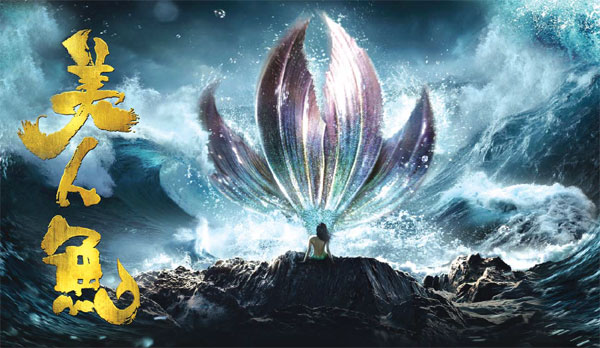A fish out of water

Chow breaks new ground with The Mermaid to show he's prepared to push himself creatively
Despite being a comedy, there's something disturbingly dark about Stephen Chow's latest film, The Mermaid (美人鱼). Take a Katherine Heigl rom-com and add Jurassic Park, Looney Tunes, Alice in Wonderland and the most disturbing nightmare you ever had as a child, and you might get something along the lines of Chow's recent project.
Having grossed $523 million at the box office, The Mermaid is already one of the highest earning pictures of all time in China.
Chow, whose previous films include Kung Fu Hustle, Journey to the West: Conquering Demons, and Shaolin Soccer, is one of the key figures in modern Chinese slapstick comedy. His absurd style employs singing and dancing, Tom-and-Jerry chase sequences and a host of other techniques he has developed over the years.
The Mermaid is no exception: A young mermaid is sent to assassinate a real estate developer who has polluted the oceans, but instead (spoiler alert) they fall in love.
It's the most accessible bit of classic Chow tomfoolery mixed with environmental fable since Kung Fu Hustle, and yet Sony Pictures gave it an incredibly limited release in the United States. It's sad, because the move genuinely has something to offer audiences of all nationalities: A hilarious parable of environmentalism that seeks to emphasize the ecological devastation of environmental pollution through farcical humor and a love story that's so absurd that nearly anyone should get the point.
The film begins with a slapstick venture through the Museum of World Exotic Animals, somewhere along the coast of Guangdong province, a jab at the local habit of eating to near extinction many of the animals that live there. It's also a commentary on the current depleted state of the animal kingdom; the pudgy museum owner displays a bunch of fake exhibits including a hybrid of a salted mackerel.
Liu Xuan, a millionaire real estate developer, is looking to acquire Green Gulf, a protected cove that is home to rare dolphins. To follow through with his dastardly plan to develop it into oceanfront property, he hires a team of boatmen to chase out all the marine life with powerful sonar guns.
Unknown to him, the cove is also a sanctuary for "merpeople", who start to fall sick and die. One of the few survivors, Shanshan, who lives in the belly of a sunken ship, is sent to kill Liu by half-man half-octopus Brother Eight. However, after meeting, Shanshan and Liu develop feelings for each other.
Meanwhile, Ruolan, the icy daughter of Liu's tycoon rival, played by Tsui Hark, has her own plans for amassing her fortune, whether it takes seducing Liu or brutalizing her way into Green Gulf.
The final showdown almost plays itself out: Liu, having fallen in love with Shanshan, is pitted against Ruolan and her boatmen in a fitting show of brutality and comedy that has become a staple of Chow's directorial style.
While sometimes Chow's movies can be rather unpredictable, The Mermaid follows a rather straight path after its rambling opening sequence. The fun comes not from knowing that Shanshan and Liu are heading toward a fairy-tale ending, but from the silly antics Chow employs to get them there.
While The Mermaid is a great movie, it's apparent Chow is willing to branch out into new forms, pushing the boundaries to avoid endlessly remaking successful set pieces. Undoubtedly, he will add even greater jewels in his crown over time.
Courtesy of The World of Chinese
www.theworldofchinese.com
Shanshan: You're crying because it tastes so good, right? I cried the first time I tried it.
Hǎo chīdé kū le ba? Wǒ dì yīcì chī de shíhòu wǒ yě kū le.
好吃得哭了吧?我第一次吃的时候我也哭了。
Liu Xuan: It reminds me of my father. Back then, our family was impoverished and we had to pick up leftovers from the streets. One day, my father brought back half a chicken leg. It tasted just like this. So, from a young age I decided, I ...
Wǒ xiǎngqǐ wǒ bà. Nàgè shíhòu, wǒ jiā lǐ hěn kǔ, wǒmen zhǐnéng shàngjiē jiǎn chī de. Yǒu yī tiān wǒ bà jiǎn le bàn zhī jītuǐ huílái. Jiùshì zhè gè wèidào. Suǒyǐ, wǒ cóngxiǎo jiù lìzhì, wǒ …
我想起我爸。那个时候,我家里很苦,我们只能上街捡吃的。有一天我爸捡了半只鸡腿回来。就是这个味道。所以,我从小就立志,我 ...
S: You have a lot of grease on your mouth. (She wipes his mouth.)
Nǐ zuǐshàng yǒu hěnduō yóu.
你嘴上有很多油。
L: … So, from a young age, I decided to make a lot of money in the future.
… Suǒyǐ ne, wǒ cóngxiǎo jiù lì zhì, wǒ wèi lái yào zhèng hěnduō hěnduō qián.
… 所以呢,我从小就立志,我未来要挣很多很多钱。
S: What do you need that much money for?
Zhuàn nàme duō qián gànma?
赚那么多钱干嘛?
L: Is there anything more important than money in this world?
Zhègè shìjiè shàng háiyǒu shén me bǐ qián gèng zhòngyào de ne?
这个世界上还有什么比钱更重要的呢?
S: If there's not a single drop of clean water, a single breath of fresh air left on Earth, no matter how much money you make, you are still doomed.
Jiárú dìqiú shàng lián yī dī gānjìng de shuǐ, yī kǒu gānjìng de kōngqì dōu méiyǒu, nǐ zhèng zài duō de qián yě shì sǐ lù yī tiáo.
假如地球上连一滴干净的水,一口干净的空气都没有,你挣再多的钱也是死路一条。
The World of Chinese


















